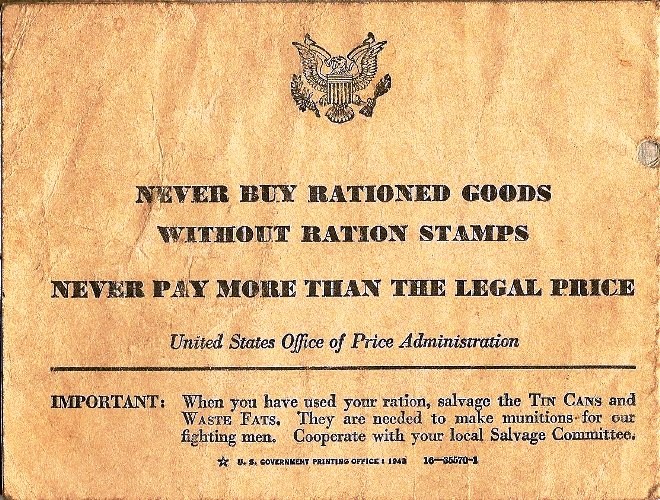 |
| Government Edict Concerning the Right to Buy and Sell on the Free Market in the US in WWII Source: http://www.nationalww2museumimages.org/education/Primary-Sources/ration-book-four-back.jpg |
Under Franklin Delano Roosevelt, the entire country became an armed camp, where the price of goods was fixed centrally, and you could not buy as much of simple domestic items such as meat or butter as you could afford to buy. You could only have as much as the government thought you should have and no more.
 |
| Source: http://www.nationalww2museum.org/learn/education/for-students/ww2-history/take-a-closer-look/ration-books.html |
If you'll notice the note at the bottom. you get the real idea behind the ration books. It was not done to make sure that the recipient had enough of everything, out of a humanitarian concern that people during wartime might go hungry. It was, on the contrary, done to prevent ordinary people form having too much to eat.
The first stamps in War Ration Book One will be used for the purchase of sugar. When this book was issued, the registrar asked you, or the person who applied for your book, how much sugar you owned on that date. If you had any sugar, you were allowed to keep it, but stamps representing this quantity were torn from your book (except for a small amount which you were allowed to keep without losing any stamps.) If your War Ration Book One was issued to you on application by a member of your family, the number of stamps torn from the books of the family was based on the amount of sugar owned by the family. and was divided as equally as possible among all these books.
In other words: "If you like your sugar, you can keep it, but we will see to it that in the future you never have any more than we think you should have."
 |
| Standing in Line for Food Ration Stamps -- New Orleans 1943 Source: Wikipedia |
In 1943, a number of Americans, together with other Allied nationals, were interned in a camp in Shandong Province, China run by the Japanese. One of the greatest sources of suffering for these Americans was that though they did have money, they were not allowed to engage in free trade with the Chinese farmers just outside their camp, in order to buy ordinary foods such as farm fresh eggs. There was enough food available, and they had enough money to buy it, but the transactions were illegal, and hence engaged in on pain of death. For many of these Americans, it was their first experience of food rationing and of being forced into clandestine black market transactions in order to purchase enough to eat. But there was really nothing to complain about to the Japanese in terms of a violation of their civil rights on that account. President Roosevelt had already instituted national rationing the year before! It was just that as expatriates living in China. they were not home to see it.
According to the Wikipedia:
In June 1942 the Combined Food Board was set up to coordinate the worldwide supply of food to the Allies, with special attention to flows from the U.S. and Canada to Britain.
What would Jean Laffite say about that, if he knew? Did the Americans defeat the British at the Battle of New Orleans only to lose their right to buy and sell food freely so the British could have more American grown food to eat?
No comments:
Post a Comment